Former President Donald Trump’s recently filed lawsuits against Facebook, Twitter, and Google’s YouTube channel should come as no surprise. Following the Jan. 6 insurrection at the U.S. Capitol, Trump was de-platformed from mainstream social media and has since struggled to use alternative online venues—for example, his own blog and video platform Rumble—to maintain his relevance. However, such attempts have been largely unsuccessful. The recent lawsuits act well as a means for recourse and fundraising tactics, with riled-up supporters directed to “fight back” through donating to the Save America PAC and the America First Policy Institute.
The proposed lawsuits argue that banning Trump from social media is a violation of his First Amendment rights. They also refer to Section 230 of the Communications Decency Act, which the former administration attempted to dissolve prior to the end of his tenure. In short, Section 230 establishes that “no provider or user of an interactive computer service shall be treated as the publisher or speaker of any information provided by another information content provider.” The lawsuits claim that this statute was deliberately enacted by Congress to pressure social media into removing objectionable speech, as Congress did not have the power to do so themselves. The statute would, allegedly, therefore count as an “unconstitutional delegation of authority” to censor Trump and other conservatives.
Previous governmental attempts to force social media companies to host political speech have not been successful. Recently, Florida Republican Gov. Ron DeSantis proposed a law prohibiting social media platforms from banning conservative politicians and media but was blocked by federal Judge Robert Hinkle for violating the First Amendment and Section 230. Trump’s argument on Section 230 is also unlikely to succeed. When various platforms banned the former president for hate speech and inciting violence, they were within reason of their terms of service, which are binding contracts between social media and their users. To substantiate an argument around Section 230, Trump would have to prove that social media companies applied their terms of service unequally to him, and that other online voices were not scrutinized—again, a potentially difficult assertion to prove given the fluidity of the internet and the behavior of algorithms.
While the lawsuits likely have little legal basis to succeed, the First Amendment argument may be an interesting turn in his favor, especially as it applies to government censorship and the power of private corporations to regulate content on their platforms. In Trump’s lawsuit, he claims that the bans have impacted his communications necessitated by “his unquestioned position as head of the Republican Party,” and “laying a foundation for a potential 2024 presidential campaign.” This begs the question of what happens if he announces that he is a candidate in 2024, and how social media platforms will react to his existing bans. The courts take a very broad view of freedom of expression, particularly with political candidates, in order to prevent censorship and oppression of minority views. Similar pressures exist within tech companies, leaving many initially hesitant to ban Trump from their platforms in spite of violations of their terms of service. In 2019, Facebook’s Mark Zuckerberg had vowed not to ban political candidates from the platform. It will be interesting to see whether such stances from both the courts and social media companies will change in the future.
The revisitation of the former president’s social media bans serves as a reminder of unfinished business in the discussion around changing or removing Section 230. That is, is it still appropriate for today’s information disorders? While both parties agree on little nowadays, they are united in their quest to limit tech companies’ liability shield and apply more pressure on their online behaviors. For the past year, Republican animosity towards Big Tech continues to be grounded in its take-downs of baseless accusations of electoral fraud in the 2020 elections and misinformation surrounding the COVID pandemic and the vaccine. Meanwhile, Democrats argue that tech companies have not done enough to regulate harmful content.
This collective discontent has led to a flurry of bills in Congress. Republican-sponsored bills include the Abandoning Online Censorship Act sponsored by Rep. Louie Gohmert (R-Tex.) and the 21st Century Foundation for the Right to Express and Engage in Speech Act sponsored by Sen. Bill Hagerty (R-Tenn.), both of which seek to repeal Section 230. Meanwhile, Democrats have proposed bills such as Protecting Americans from Dangerous Algorithms Act, sponsored by Reps. Tom Malinowski (D-N.J.) and Anna Eshoo (D-Calif.), which create legal liability for platforms that host content that violates civil rights. At the same time, the bipartisan bill, See Something, Say Something Online Act of 2021, sponsored by Sens. Joe Manchin (D-W.V.) and John Cornyn (R-Tex.), seeks to place greater accountability on tech companies for content that violates the platforms’ terms of service.
Shortly after Trump’s lawsuits were announced, House Judiciary Republicans released their agenda targeting Big Tech in line with Trump’s criticisms. As the lawsuits add another notch in the former president’s playbook, it is a clear jolt to the existing debates around the information disorders fueled by social media companies. Regardless of the outcome, the actions may serve as a reminder to legislators and policymakers that how social media platforms engage in content moderation is critical, and that the final rendering of clear and structured regulatory frameworks are even more significant.
Google and Facebook are general, unrestricted donors to the Brookings Institution. The findings, interpretations, and conclusions posted in this piece are solely those of the author and not influenced by any donation.
The Brookings Institution is committed to quality, independence, and impact.
We are supported by a diverse array of funders. In line with our values and policies, each Brookings publication represents the sole views of its author(s).

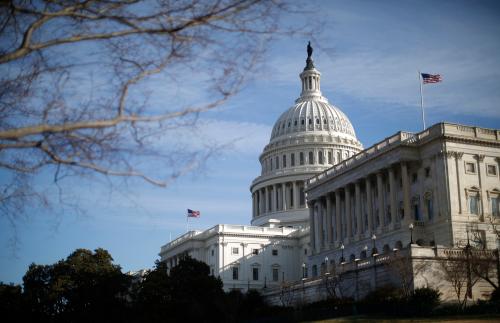
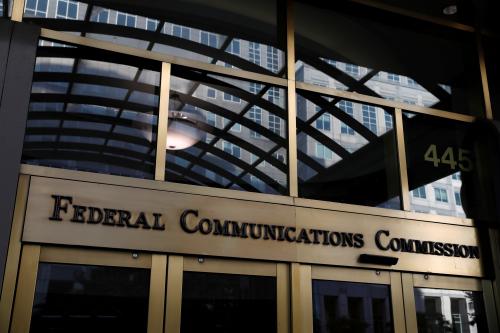
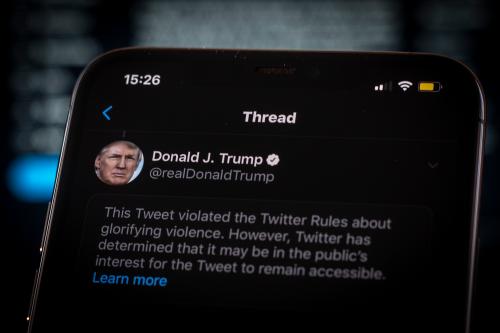

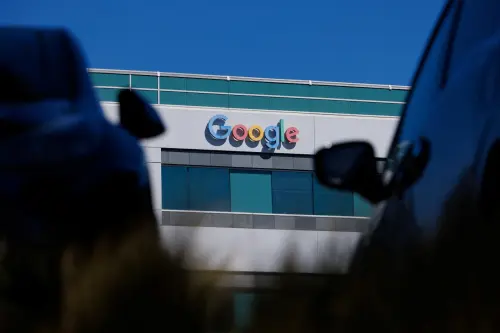
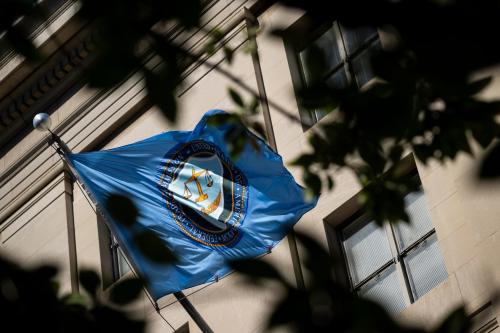
Commentary
Trump’s Big Tech lawsuits highlight the urgency of Section 230 reform
July 15, 2021